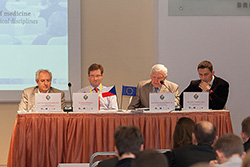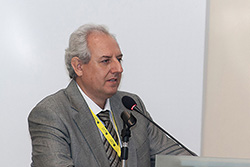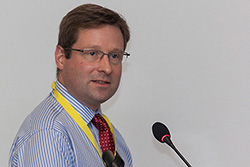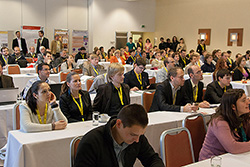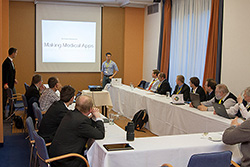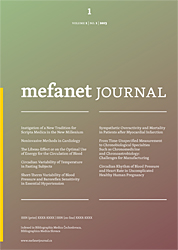
MEFANET Journal 2014; 2(1): 26–29
EDITORIAL MATERIAL
MEFANET 2013: the circle of life
Jakub Gregor, Daniel Schwarz*, Martin Komenda, Lenka Šnajdrová
Institute of Biostatistics and Analyses at the Faculty of Medicine and the Faculty of Science of the Masaryk University, Brno, Czech Republic
* Corresponding author: schwarz@iba.muni.cz
Abstract
Article history:
Available online: 18 April 2014
Download PDF
Supplementary material
Number seven is considered to be lucky and magic; it is even a “lucky number” in a mathematical concept that was defined in the 1950s. Although the degree of personal happiness and enchantment of participants in the 7th year of the MEFANET conference inevitably varied, the network of Czech and Slovak medical faculties has undoubtedly won favour with all of them.
Keywords
MEFANET; medical informatics; e-learning; virtual patient; e-assessment
Like last year, the traditional two-day conference took place in the Hotel International in Brno (Czech Republic), which provided its premises on 26–27 November for the meeting of representatives of medical and health care faculties and other faculties that deal with modern methods of medical education and the use of information technologies in this field. Welcome of the participants and opening of the conference was given by Prof. Stanislav Štípek (1st Faculty of Medicine, Charles University in Prague), followed by a traditional “State of the Union” message, which was presented by Dr. Daniel Schwarz (Institute of Biostatistics and Analyses, Masaryk University). He focused on six fields and goals that MEFANET has attempted to achieve: sharing electronic teaching and learning materials; quality evaluation of digital educational resources (both items can be considered to be finished); use of e-assessment systems; extending the MEFANET platform into a comprehensive ICT infrastructure; expanding the network by attracting new institutions; and promoting the network while looking for crucial funding at the same time.
Figure 1: Plenary session chairs (from left): Prof. Panagiotis Bamidis, Dr. Simon Wilkinson, Prof. Stanislav Štípek and Dr. Daniel Schwarz
Figure 2: Prof. Panagiotis Bamidis, Aristotle University in Thessaloniki
Figure 3: Dr. Simon Wilkinson, University of Nottingham
Figure 4: Conference audience
Figure 5: Workshop led by Dr. Adrian Raudaschl
Invited speakers from abroad have always been an indispensable part of the plenary section of the MEFANET conference, and this year was not an exception. The first one was Prof. Panagiotis Bamidis of the Aristotle University in Thessaloniki. His initial compliment towards the unique Central European cooperation in the field of medical education was certainly not just a courtesy to conference organisers. The lecture itself, entitled “The Role of Big Data and Learning Analytics in Medical Education“, focused mostly on final stages of the whole process of development and use of educational materials – an analysis on how users work with the publications, what they are interested in, and for how long. All such data can be assessed, providing a lot of inspiration and impulses for further development. These are frequently high-volume data, by far exceeding the scope and capabilities of regular databases; they are therefore referred to as “big data”.
If there is a traditional source of invited speakers for the MEFANET conference, it is undoubtedly the United Kingdom, which was this time represented by Dr. Simon Wilkinson of the Newcastle University. His lecture dealt with another hot topic of the medical education, and that was e-assessment. He introduced the Rogö system and the “4P” concept (Purpose, People, Process, Performance), which should be followed during the whole process of development and use of electronic tests. He also pointed out some practical aspects of e-asssessment, e.g., how to elegantly solve problems of technical nature (having 300 students sitting at 300 PCs, it is very likely that at least one of the students forgets his personal access data, and that the operation system is down in at least one of the PCs), or that it is important to respect students with various disabilities.
After all, a separate section of lectures on the 2nd day of the conference confirmed the fact that e-assessment is a rewarding and heterogeneous topic. It included both theoretical lectures given by leading experts in this field from the 1st Faculty of Medicine, Charles University in Prague, and the Faculty of Medicine at Masaryk University, Brno, and featured practical contributions demonstrating the performance and specific problems. In any case, we can conclude that users’ evaluation of the educational materials and electronic tests is a final step, which returns the whole development process to the beginning of its life cycle, leading to the creation of a new product which reflects experience from the previous stage. Therefore, the term “circle of life” has its meaning even in the medical education.
Dr. Adrian Raudaschl (Medikidz Ltd., UK) was another distinguished guest from abroad; most of the participants had seen him the previous year, when he had given his videoconference lecture. This time, he arrived to Brno in person in order to lead the workshop entitled Gamification of Medical Education. During the 75 minutes dedicated to the workshop, he guided the participants through the life cycle of software applications and games for medical education, and allowed non-professionals to take a closer look at the development, employment, and testing of application prototypes. Besides numerous demonstrations of medical applications, he also succeeded in participants’ active involvement; after being separated into four groups, they suggested the basic design of four different applications, which might fill a gap in the market soon, at least according to the recent survey by App Store and Google Play.
The conference programme was very rich and extensive as usually; let us mention, for example, the section on clinical data safety and management, which has been an increasingly more recognised topic not only in education, but particularly in everyday hospital practice. Cyber-attacks have recently become more real and frequent than terrorist attacks; this can happen to anyone, requiring a quick reaction in the order of seconds. And what is most important, it is not a matter of “IT guys” only, but of all users connected to the Internet, although they might perceive some rules as bothering and pointless.
The impact of e-learning on a specific medical field is a traditional part of the MEFANET conference as well; this year, it was biophysics and medical informatics. Both of these areas, which are essential to the understanding of some aspects of medicine, are now integral parts of education of future physicians and health care professionals. Nevertheless, some messages were rather pessimistic, especially when addressing new students’ knowledge of fundamentals of physics and generally their “enthusiasms” into this field.
The 7th year of the MEFANET conference again confirmed the rising involvement and activities of non-medical health disciplines. No less than two separate sections were reserved for them and the topic of education of nurses and other health care professionals trickled in other parts of the programme as well as in discussions. Lots of educational materials have already been created by teachers of non-medical health disciplines; however, it is obvious that they will have to go through a similar process as the entire MEFANET, such as ensuring the guarantee of content and comprehensive quality assessment, among others.
The section focused on legislative aspects of MEFANET activities, new policies of university publishers, and the “open access” principle was followed by a very rich and fruitful discussion. The discussion was opened by Prof. Stanislav Štech (Vice-rector of the Charles University in Prague), Petr Valo, MSc (Director of the Karolinum publishing house), Dr. Hana Dziková (Director of the Publishing House of the Palacký University in Olomouc), and Jakub Michálek, MSc (lawyer, Vice-president of the Czech Piracy Party). The participants pointed out the absence of coordination activities in the Czech Republic with respect to the development of uniform “open access” policies and attitudes. It is also evident that the conference organisers will have to reserve longer time for these issues in future, as they bring very attractive topics to be discussed in the MEFANET community.
After expressing thanks to all partners, chairs, lecturers, and participants, the conference was concluded by a public meeting of the MEFANET Coordinating Council. All persons involved expressed their satisfaction with this year’s conference, as well as with the redirection from parallel sections to the “single track” design of the programme. A technical discussion was held on the issue of a recently launched MEFANET Journal (print: ISSN 1805-9163, online: ISSN 1805-9171), its focus and indexing in journal databases.
The tradition of MEFANET conferences will continue in 2014: the 8th meeting of Czech and Slovak medical faculties will be held on 26–27 November 2014 in Brno.
Supplementary material
Keynote lectures are available at the MEFANET Youtube channel.
Please cite as:
Gregor J, Schwarz D, Komenda M, Šnajdrová L. MEFANET 2013: the circle of life. MEFANET Journal 2014; 2(1): 26-29. Available at WWW: http://mj.mefanet.cz/mj-03140331.
This is an open-access article distributed under the terms of the Creative Commons Attribution-NonCommercial-ShareAlike 3.0 License (http://creativecommons.org/licenses/by-nc-sa/3.0/), which permits unrestricted use, distribution, and reproduction in any medium, provided the original work, first published in the MEFANET Journal, is properly cited. The complete bibliographic information, a link to the original publication on http://www.mj.mefanet.cz/, as well as this copyright and license information must be included.
